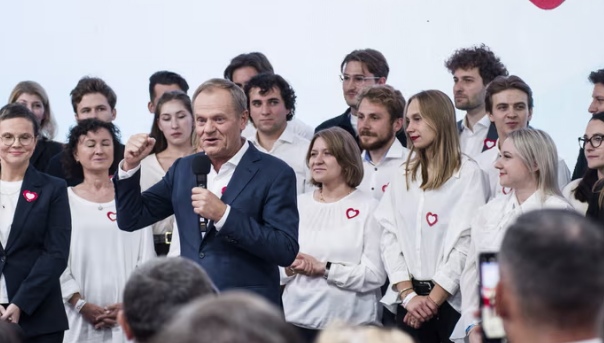According to exit polls, Poland’s opposition could win a parliamentary majority in the election, bringing to an end the eight-year rule of the populist Law and Justice (PiS) party.
Former EU chief Donald Tusk’s Civil Coalition could win 163 seats in the 460-seat parliament, while two small parties – the Third Way and the Left – could win 55 and 30 seats respectively, exit poll data showed. Mr Tusk said after the results of the vote were announced:
“Poland has won, democracy has won. It is the end of this grim period. PiS’s reign is over.”
This vote will determine the future of democracy in Poland, because while in power PiS has introduced a series of measures aimed at suppressing democracy. PiS is also an important ally of Ukraine, providing it with military assistance.
It has also improved the supply of the Polish army, turning it into one of the most powerful armed forces in Europe, making Poland a key American ally and a leading member of NATO. The party is tough on abortion, migrants and refugees. The say only they can prevent an “invasion” of refugees, although Poland took in 1.6 million Ukrainian refugees last year after the war began in February.
The PiS had a conflict with the EU over several constitutional issues, resulting in Brussels suspending funding for various projects worth billions of euros.
Michal Baranowski, an analyst at the German Marshall Fund, claimed Poland could now “return to the centre of decision-making in the European Union”. Mr Baranowski said the poll results pointed to the possibility of a “stable opposition government”. Analysts warn any opposition coalition could face frequent clashes with President Andrzej Duda, a PiS ally. The exit poll results do not give potential opposition allies the necessary three-fifths majority to override a presidential veto.
According to exit polls, turnout in the election was high at 72.9 per cent, a record for post-communist Poland. Sylwester Marciniak, head of the National Electoral Office, said:
“The turnout is probably, and by a lot, the highest since elections in 1989 when communism ended.”
The head of the National Electoral Office noted that voting had to be extended because some polling stations ran out of ballots due to the large number of people.
Ewa Bankowska, 43, a finance worker, told AFP as she voted in Halinow, a town just outside the capital Warsaw. She said:
“It’s time for a change. I’m concerned about the economy. I would like us to develop and for the government to stop spending money it does not have.”
Earlier, almost half a million Poles took to the streets of Warsaw to protest the PiS party saying the party was reversing many of the achievements made since Poland emerged from communist rule in 1989.
